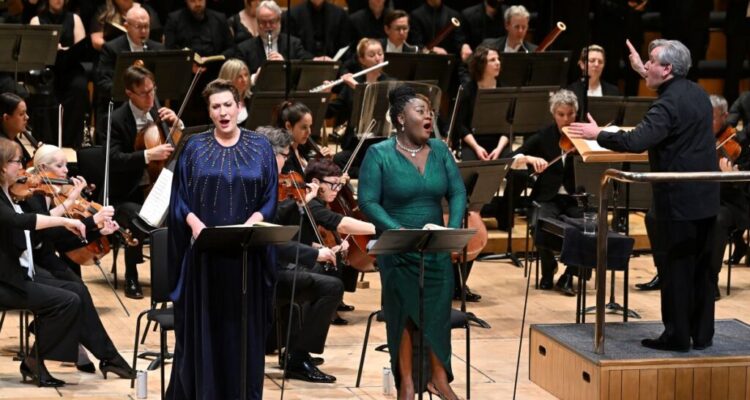The bible story of Elijah is found in Kings Chapters 17 and 18. Israel had been governed by evil kings, who had forsaken God, worshipping Baal. God sent his prophet, Elijah, to guide them out of corruption and suffering.
Felix Mendelssohn was a child prodigy, born to a Jewish family whose parents converted to Lutheranism. Mendelssohn became one of the most important musical personalities at the time and a favourite of Queen Victoria. Mendelssohn had been working on Elijah for about 10 years, when Birmingham commissioned it; Elijah was speedily finished. The 1846 first performance in Birmingham which he conducted, was ecstatically received – ‘Never was there a more complete triumph or speedy recognition of a great work of art,’ said the Times. Mendelssohn wrote the soprano part for Swedish soprano Jenny Lind, but she was not available for the premiere. Mendelssohn suffered a series of strokes and died a year later aged 38. She sang the charity performance to raise money for a composer’s scholarship soon after his death. The first beneficiary was Sir Arthur Sullivan.
Music from Elijah was chosen for the opening concert at the Carnegie Hall in 1891, and again for its centenary in 1991.
“Elijah is like an opera. It comes right at you, and the choruses are overwhelming, and yet it also has lyrical moments, the oases of calm that make this piece just so beautiful” – Sir Antonio Pappano
Pappano, soon-to-be principal conductor of LSO, starts with a bang, making the most of a dramatic overture. He as exciting to watch out of the orchestra pit as he is to hear. Conducting without a baton, he leaps and jumps to the music and the dramatic entrance of the chorus was overpowering. Full credit to the chorus – their diction is excellent.
Four soloists tell the story, three taking multiple parts; Elijah drives the narrative.
Canadian bass-baritone, Gerald Finley is a standard-bearer for contemporary opera as well as being comfortable singing Mozart. Not many singers can do that. His Elijah dominates the narrative. Elijah’s music does not call for dramatic loud climaxes. Elijah the prophet of doom, God’s mouthpiece, is devoid of warmth. After one bar, he opens the work – ‘As God the Lord of Israel liveth…there shall in these years be neither dew nor rain upon the earth…” Elijah is then silent for 20 minutes until he returns a child from the dead, challenges Baal’s priests mockingly to a fire contest which they lose, and confronting the wicked Ahad and Jezebel. Finley takes the warmth out of his voice, instead chillingly delivering God’s prophesies. Part 2 allows him personal introspection – ‘It is enough…Oh Lord, I have laboured in vain’. As the cellos played without vibrato for ‘it is enough’, Finley also sings without vibrato, allowing us to see the depths of Elijah’s soul. Finley’s intelligent delivery and subtle shading of the text is moving. Elijah, rewarded for his years of suffering is sent by whirlwind to heaven in a fiery chariot.
English mezzo Sarah Connolly displays a gorgeous array of textures, warmth and shading in ‘woe unto them’ in the first half, and turns evil Jezebel’s music in the second half into dramatic ariosos.
English tenor Allan Clayton, is hailed as one of the best tenors of his generation; his performance shows why. Portraying many different characters, his voice reflected these differences perfectly. His voice is shiningly clear, his pianissimo is stunning, his vocal palette generous.
South-African soprano Masabane Cecilia Rangwanasha is a former Jette Parker artist, winning Cardiff Song prize in 2021. She breathes life into every note. As the widow begging Elijah to raise her son from the dead, she shows warmth and richness of tone. ‘Hear me Israel’ at the beginning of Part 2 is ravishing and the highlight of the performance.
The final quartet is magical.
Performances of this calibre are a rarity: both performances have been understandably sold out.
With Pappano soon at the helm, we can hope for more.
ORATORIO IN THREE ACTS
Concert Performance London Symphony Orchestra
Music by Felix Mendelssohn (1809-1847)
German libretto Julius Schubring from the Lutheran Bible
English translation by William Bartholemew
Conducted by Sir Anthony Pappano
Photo credit Mark Allan
Cast includes Dame Sarah Connolly, Masabane Cecilia Rangwanasha, Allan Clayton MBE, Gerald Finley, London Symphony Chorus, The Guildhall Singers.
Running time 2 hours 45 minutes with interval.
Barbican Hall London on 28, 31 January 2024
Recorded for future broadcast on Marquee Tv from 22nd February and for future release on LSO live.

